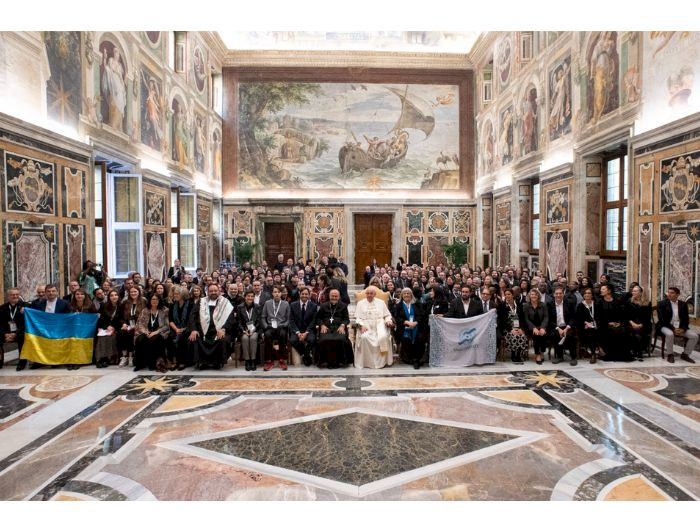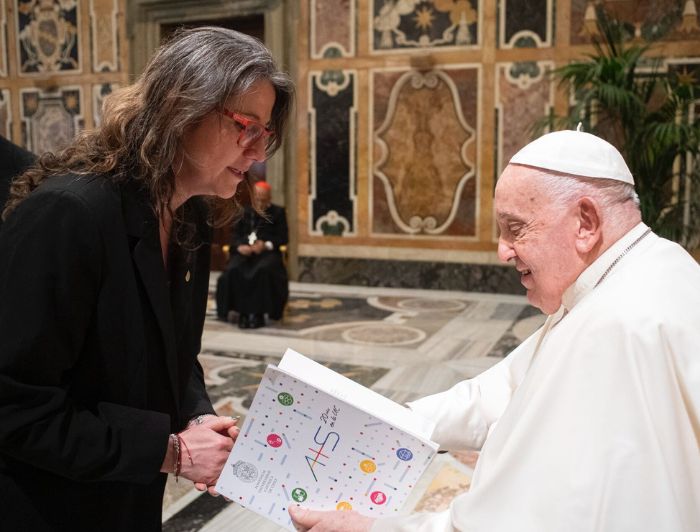UC Chile Marks Two Decades of Service-Learning with Pope Francis in Rome
03 December 2024
As part of the V Uniservitate Global Symposium, titled "Service-Learning: Transforming Higher Education from Within," the UC Chile delegation met Pope Francis and presented him with a book commemorating 20 years of Service-Learning methodology (*) at the university.

photo_camera Uniservitate is a global association of Catholic universities founded in 2020. It aims to institutionalize Service-Learning methodology as part of holistic education in Catholic higher education institutions. (Photo Credit: Vatican Photographic Service, 2024.)
The V Uniservitate Global Symposium took place in Rome from November 7 to 9, bringing together presidents, deans, faculty, Service-Learning directors and coordinators, student winners of the 2024 Uniservitate Award, researchers, and community partners. This year's theme was "Service-Learning: Transforming Higher Education from Within."
The event included 20 representatives from Latin American Catholic universities within the Uniservitate network. UC Chile's delegation featured:
- Chantal Jouannet, Director of the Teaching Development Center (CDDoc),
- Rocío Fontana, professional at Uniservitate UC LATAM,
- Cristián Núñez and Mario Inzunza, professors from the Faculty of Theology, recipients of the 2023-2024 Uniservitate Research Fellowship, and
- Pamela Rojas, a professor from the Faculty of Medicine, received an honorable mention for her project "Service-Learning in Family Medicine Internships," which has implemented the methodology for over 12 years.
Chantal Jouannet also represented UC Chile's president at a meeting of Catholic higher education leaders. The discussion focused on strengthening the governance and sustainability of the Uniservitate program through 2026 and evaluating progress and challenges in institutionalizing Service-Learning during the network's first five years.
The delegation also met with Cardinal José Tolentino de Mendonça, the Dicastery for Culture and Education Prefect.
Meeting Pope Francis
On November 9, the UC Chile delegation had a private audience with Pope Francis. During this meeting, Chantal Jouannet presented him with a book commemorating two decades of Service-Learning at UC Chile.
"It was significant to meet the Pope and share a part of our university's work in forming committed students who are aware of their surroundings," Jouannet reflected. "This milestone allows us to showcase the faculty, students, and community partners we've collaborated with and share UC Chile's vision for more inclusive and impactful classrooms."
Transformative Experiences
Mario Inzunza, a professor in the Faculty of Theology, first encountered the Service-Learning (S+L) methodology while coordinating General Theological Education courses.
"As director, I oversee various subjects offered to all UC Chile students. I discovered several colleagues integrating this methodology into courses on art, interfaith dialogue, and disability, among others," Inzunza said."It became clear how beneficial these experiences were for students, faculty, and community partners alike."
He noted that while public engagement is significant, "Service-Learning courses also open pathways to teamwork, horizontal relationships with community partners, and exploration of existential questions."
Reflecting on the symposium and audience with Pope Francis, Inzunza said:
"The global dialogue with peers who strive to offer meaningful, transformative learning experiences was inspiring. The Pope's emphasis on fostering curiosity in students resonated deeply—he described how the question 'why' should drive the educational process."
Cristián Núñez, also from the Faculty of Theology, shared how Service-Learning complements his courses on spirituality and disability.
"This methodology uniquely enables students to engage meaningfully, fostering a collaborative dialogue with society and their peers," Núñez said. "It transforms the university into a space for holistic education that extends beyond technical knowledge."
For Núñez, the symposium was a chance to reimagine his teaching approach:
"Interacting with diverse realities united by the hope that education can change the world was eye-opening. Despite our varied cultural backgrounds, we shared a unified belief in education's power to address societal challenges."
The week culminated in Pope Francis' words, which Núñez described as the perfect conclusion:
"His message of hope and the role of education in building a better world reinforced my commitment to advancing Service-Learning."
Service-Learning in Medical Education
Pamela Rojas, a professor in the Faculty of Medicine, highlighted the critical role of Service-Learning in addressing the social determinants of health in family medicine.
"UC Chile students often engage with complex clinical scenarios but have fewer opportunities to address broader social challenges," she explained. "Service-Learning shifts students from passive recipients of knowledge to active agents of social transformation."
As her project nears the final stages of medical training, it provides students with a space to reflect on their role in society and envision themselves as capable professionals equipped to address complex realities.
Reflecting on her experience in Rome, Rojas said:
"Preparing the Uniservitate application allowed me to systematize 12 years of progress and reengage with the methodology's impact. Interacting with colleagues from five continents offered a rare opportunity for reflection and collaboration."
She particularly valued Pope Francis' call for transformative education:
"His words emphasized that education must go beyond transmitting knowledge to transform lives truly. This reaffirmed my commitment to sustaining these initiatives, which, though challenging, are vital for shaping future professionals."
Service-Learning (S+L) is a teaching methodology that combines active learning and community engagement. Students apply their knowledge to real-world contexts by providing meaningful services to community partners.
In 2024, UC Chile marked 20 years of implementing Service-Learning and celebrating its impact on students, faculty, and communities. The milestone was commemorated in a seminar led by the Teaching Development Center under the Office of the Vice President for Academic Affairs.
Rocío Fontana, from Uniservitate UC LATAM, summed up the methodology's ethos: "Service-Learning seeks to transform people and, through them, societies. It encourages empathy, collaboration, and responsibility, enabling students to address real problems and become professionals dedicated to societal well-being."





